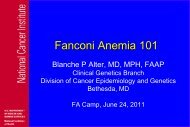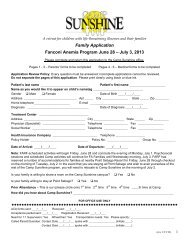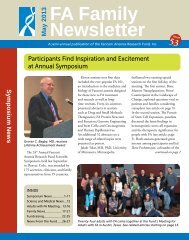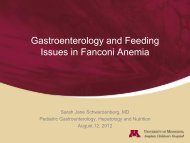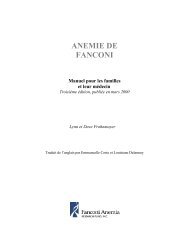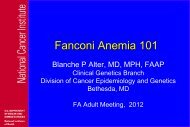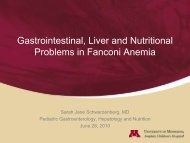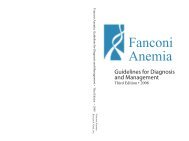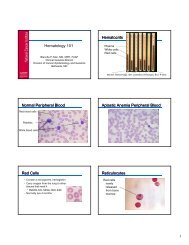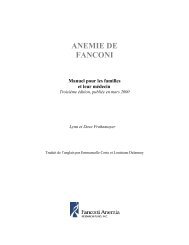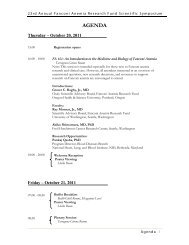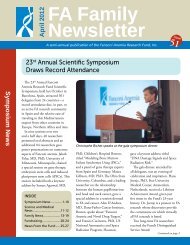FA Family Newsletter - Fanconi Anemia Research Fund
FA Family Newsletter - Fanconi Anemia Research Fund
FA Family Newsletter - Fanconi Anemia Research Fund
- No tags were found...
You also want an ePaper? Increase the reach of your titles
YUMPU automatically turns print PDFs into web optimized ePapers that Google loves.
Plans Under Way to Study <strong>FA</strong> Parental IssuesRelated to PGDThis year marks the 10-year anniversary of the successfuluse of pre-implantation genetic diagnosis (PGD) withhuman leukocyte antigens typing for <strong>Fanconi</strong> anemia.Heather Zierhut, MS, a certified genetics counselor, notesthat much has changed since this technology began. Shewrote a grant to study the ethical, legal, and psychosocialissues that have surrounded this subject. Through anelectronic survey, she and her collaborator will ask allparents of children with <strong>FA</strong>, not just those who haveundergone PGD, about their decision-making, opinionsand experiences with the use of this technology. <strong>Research</strong>erswill invite <strong>FA</strong> groups in Canada, the United Kingdom andAustralia to participate. The survey will be emailed to <strong>FA</strong>parents shortly. The study results will be presented at theBrocher Foundation Symposium in Geneva, Switzerland,in November.Managing Head and Neck Cancer in <strong>FA</strong> PatientsDavid Kutler, MD, WeillCornell Medical College,gave a comprehensiveoverview of head and necksquamous cell carcinoma(HNSCC) in the <strong>FA</strong>population. While thiscancer is relatively rare in thegeneral population, 21% of<strong>FA</strong> patients will experienceHNSCC by age 40 at amedian age of 31. In the non-<strong>FA</strong> population, smokingand/or drinking causes HNSCC. <strong>FA</strong> patients should notdrink or smoke and must avoid second-hand smoke.Sixty-five percent of <strong>FA</strong> HNSCCs occur in the oralcavity. They appear as ulcers or masses in the mouththat do not heal or go away. The human papillomavirus(HPV) has been implicated in certain HNSCCS in thegeneral population and in 83% of <strong>FA</strong> tumors, accordingThree take-aways from the presentation:• Patients should not drink or smoke and mustavoid second-hand smoke.• Dr. Kutler strongly recommends that <strong>FA</strong>patients, male and female, receive the HPVvaccine.• Surveillance should begin around the age of9 and should be repeated every six monthsand more frequently if cancer is diagnosed.to one study. Dr. Kutler strongly recommends that <strong>FA</strong>patients, male and female, receive the HPV vaccine. Thisvaccine protects against HPV subtypes 16, 18, 7 and 11;HPV16 causes 90-95% of HPV-related cancers, so thisvaccine might protect against many <strong>FA</strong> malignancies.Treatment of HNSCCs can cause tremendousmorbidity and negatively affect quality of life. Smalltumors can be surgically removed; surgical removal oflarge tumors can be devastating. Doctors sometimes userobotic surgery to remove head and neck cancer, whichenables surgical removal through the mouth, therebycausing less morbidity.Dr. Kutler reported on 12 <strong>FA</strong> patients who underwentradiation therapy at his center. The average dose ofradiation was 5,278 rads. Eight of 12 patients died, fourduring the course of radiation. Patients experienced highgrademucositis, inability to swallow, low blood counts,esophageal stenosis and wound breakdown. Radiationtherapy should be done only for more advanced tumorsand by surgeons experienced in <strong>FA</strong>. Chemotherapy suchas cisplatin should be avoided but Erbitux is a possibleoption for <strong>FA</strong> patients.Early detection is crucial. Head and neck surgeons(otolaryngologists) for adults should conduct surveillanceexaminations, because pediatric ENTs do not commonlysee or diagnosis head and neck cancer.The youngest <strong>FA</strong> patient diagnosed with HNSCCwas 9. Surveillance should begin around that age and berepeated every six months and more frequently if canceris diagnosed.Science News From the <strong>Family</strong> Meeting<strong>Family</strong> <strong>Newsletter</strong> #50 5



